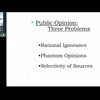extrem
Sweden, the extreme country
The research network World Values Survey has explored people's values since the 1980s in six waves of interviews in a total of 100 countries. The latest survey was completed in 2014 and the result has

James Fishkin: Is Deliberation an Antidote to Extreme Partisan Polarization?
James Fishkin: Is Deliberation an Antidote to Extreme Partisan Polarization? Reflections on “America in One Room” This talk is positioned at the intersectionof two literatures: partisan polarizatio

Att komma till Sverige - extremt och samtidigt lagom. Hur hänger det ihop?
Bi Puranen, generalsekreterare för World Values Survey som mäter värderingar i hela världen, pratar kulturkrockar på Tensta konsthall, april 2018.
James Fishkin: Is Deliberation an Antidote to Extreme Partisan Polarization? Reflections on “America in One Room”
AbstractIs Deliberation an Antidote to Extreme Partisan Polarization? Reflections on “America in One Room” Register here to join the seminar This talk is positioned at the intersectionof two literatures
“Time to Abandon Swedish Women”: Discursive Connections Between Misogyny and White Supremacy in Sweden
International Journal of Communication 18(2024) Abstract This article explores the discursive linkages between violent misogyny and violent rightwingextremism in the popular Swedish online discussion foranonymous and relatively unmoderated commenting. Empirically, it focuses on thearticulations of misogyny and anti-feminism mapped onto extreme right ideology includingwhite supremacism in user comments posted across 16 Flashback threads. To analyze theextensive data set, we first drew on a collocation analysis of user comments (N = 20,359)scraped from a strategic selection of threads. From this sample we chose 36 combinationsto be considered for a closer reading. In the second analytical step, critical discourseanalysis coupled with the Essex School’s logics approach helped us unpack the logics ofconspiracy and male entitlement, as well as the fantasmatic projections of Swedish womenas both “race traitors” and “victims” at the heart of extreme right discourse in and beyondSweden today.
Understanding Rural Change – Demography as a Key to the Future
The aim of this paper is to exploit demographic change in rural areas as a means to forecast their possible economic and social futures. The peripheral rural areas of Europe will experience problems o

H. Orri Stefánsson
I am Professor of Practical Philosophy and Wallenberg Academy Fellow at Stockholm University, and Researcher at the Institute for Futures Studies. My current research mostly concerns how one should cho uncertainty, including situations where one suspects that the outcome of one’s actions (or inaction) could be catastrophic.
On Frogs, Monkeys, and Execution Memes: Exploring the Humor-Hate Nexus at the Intersection of Neo-Nazi and Alt-Right Movements in Sweden
Television and New Media. Special issue: Nationalisms and Racisms on Digital Media. Volume: 22 issue: 2,page(s): 147-165 Abstract This article is based on a case study of the online media practices of th
“I just want to be the friendly face of national socialism” The turn to civility in the cultural expressions of neo-Nazism in Sweden
in: Nordicom Review, Volume 42: Issue S1This article is based on a case study of the media narratives of the neo-Nazi organisation Nordic Resistance Movement (NRM) and situates this particular actor w
Climate Change Denial among Radical Right-Wing Supporters
i: Sustainability The linkage between political right-wing orientation and climate change denial is extensively studied. However, previous research has almost exclusively focused on the mainstream righ= 2216), a mainstream right-wing party (the Conservative Party,,= 634), and a mainstream center-left party (Social Democrats,= 548) in Sweden. Across the analyses, distrust of public service media (Swedish Television,), socioeconomic right-wing attitudes, and antifeminist attitudes outperformed the effects of anti-immigration attitudes and political distrust in explaining climate change denial, perhaps because of a lesser distinguishing capability of the latter mentioned variables. For example, virtually all Sweden Democrat supporters oppose immigration. Furthermore, the effects of party support, conservative ideologies, and belief in conspiracies were relatively weak, and vanished or substantially weakened in the full models. Our results suggest that socioeconomic attitudes (characteristic for the mainstream right) and exclusionary sociocultural attitudes and institutional distrust (characteristic for the contemporary European radical right) are important predictors of climate change denial, and more important than party support per se.








